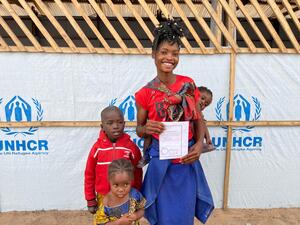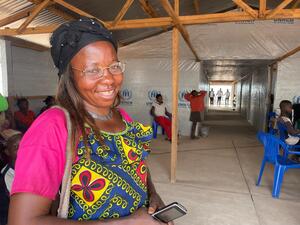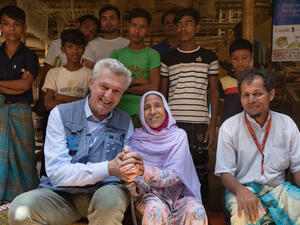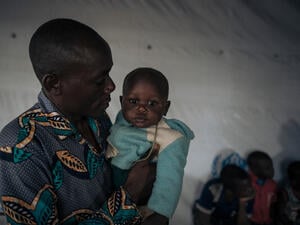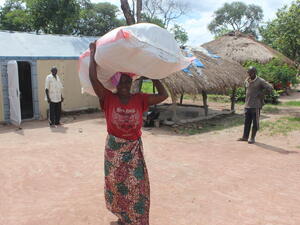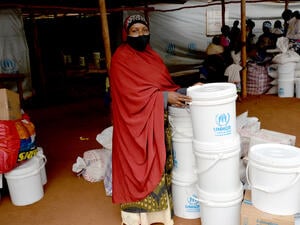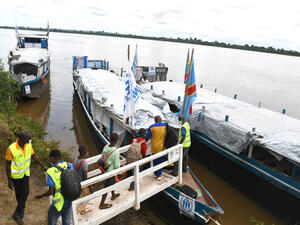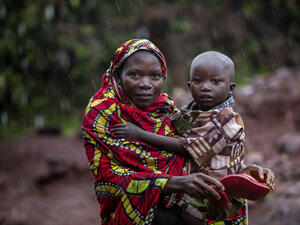UNHCR recommends the cessation of refugee status for Ivorians
UNHCR recommends the cessation of refugee status for Ivorians
UNHCR, the UN Refugee Agency, has recommended that States hosting Ivorian refugees end their refugee status and facilitate their voluntary repatriation, reintegration, or acquisition of permanent residency or naturalization for those wishing to remain in host countries.
“In light of the fundamental and durable changes in Côte d’Ivoire, I am pleased to recommend a general cessation of refugee status for Ivorian refugees to take effect on 30 June 2022,” said UN High Commissioner for Refugees Filippo Grandi, at the start of the 72nd annual session of UNHCR’s Executive Committee this week.
The recommendation to apply cessation clauses in the 1951 Refugee Convention is based on an in-depth analysis of the situation in Côte d'Ivoire. It comes with concrete measures to promote durable solutions for Ivorian refugees that will facilitate their voluntary return and reintegration into their home country, and the opportunity to seek permanent residency or naturalization, including notably for those who have formed strong ties to their host countries. Refugees who may have ongoing international protection needs will be entitled to request an exemption from cessation, through procedures reflecting safeguards in international law.
According to data available to UNHCR, there are currently approximately 91,000 Ivorian refugees and asylum seekers around the world. Some 51,000 live in West Africa – with 33,000 in Liberia alone — and a further 22,000 in Europe.
UNHCR has welcomed commitments made by States as part of the Comprehensive Solutions Strategy for Ivorian refugees, at the annual meeting of UNHCR’s Executive Committee in Geneva this week.
“I am grateful for the example set by the government of Côte d’Ivoire as well as those of Ghana, Guinea, Liberia, Mali, Mauritania and Togo, which have demonstrated political will to implement a comprehensive roadmap for solutions for Ivorian refugees, some of whom have been displaced for decades,” said Grandi. “This regional effort deserves the applause of the entire international community.”
Since 2011, some 290,000 Ivoirian refugees living in West Africa have voluntarily returned to Côte d'Ivoire. A UNHCR survey conducted in the region shows that 60 per cent of remaining Ivorian refugees intend to repatriate. Thirty per cent are still undecided, while 10 per cent have chosen to stay in their host country.
UNHCR is organizing weekly transportation from Liberia to help Ivorians wishing to return home. Since late August, some 5,000 refugees have been reunited with family members, some of whom they have not seen in decades. UNHCR is also providing financial support to returning refugees to facilitate their reintegration.
Ivorians fled two civil wars between 2002 and 2007, and 2011 and 2012. Thousands of Ivorians also fled to neighbouring countries in 2020, fearing violence linked to presidential and parliamentary elections.
UNHCR remains committed to assisting Côte d’Ivoire and host countries implement the cessation recommendation and continues to advocate for States to provide refugees with civil, identity and travel documents. In Côte d’Ivoire, this includes the issuance of birth certificates, which help ensure people can enroll in school, get national identity cards, and vote.
It is critical that States and other actors provide full support to these solutions in a timely and concerted manner to facilitate social inclusion and reduce the risk of statelessness.
The link to the Comprehensive Solutions Strategy can be found here.
Videos are available here.
For more information on this topic, please contact:
- In Dakar (regional), Fatoumata Sinkoun Kaba, [email protected], +221 78 526 87 14
- In Dakar (regional), Selim Meddeb Hamrouni, [email protected], +221 77 092 13 52
- In Geneva, Boris Cheshirkov, [email protected], +41 79 446 36 81
- In New York, Kathryn Mahoney, [email protected], +1 347 443 7646
Note to the Editor:
Displacement in Côte d’Ivoire during the last two decades
The two Ivorian internal conflicts of 2002-2007 and 2011-2012 each resulted in distinct waves of large-scale civilian displacement inside and outside the country. During the first Ivorian crisis (2002-2007), approximately 750,000 people were forcibly displaced, including 50,000 refugees who fled to Liberia, Guinea, and Mali. From December 2010 to late February 2011, post-election violence erupted, displacing another half a million Ivorians including 290,000 refugees, most of whom fled to Liberia.
Nearly all Ivorian refugees in the West Africa region who fled as a result of these two civil wars were granted refugee status on a prima facie basis under Article I(2) of the 1969 OAU Convention.
A third displacement wave happened from mid-2020 to early 2021, when 33,970 Ivorians fled in anticipation of potential violence associated with the 31 October 2020 presidential elections and the parliamentary elections on 6 March 2021. Most of them are currently registered as asylum-seekers, with their claims under review by the competent authorities.
The reasons leading UNHCR to recommend the cessation clause
UNHCR’s recommendation is based on the fundamental and durable changes that have taken place in Côte d’Ivoire since 2011. The key elements that characterize those changes are:
- The security situation in large parts of Côte d'Ivoire has gradually improved since April 2011.
- Creation of the Dialogue, Truth, and Reconciliation Commission in 2011 and national commission of inquiry to investigate human rights violations during the political crisis.
- Access to Ivorian citizenship and to national identity documents had been a central issue in the different political crises that have shaken the country, with many restrictions on access to nationality documents and the right to vote and participate in elections introduced from 1995. However, critical pieces of legislation have been adopted since 2013 to address these restrictions.
- Adoption of an Amnesty Law in December 2018.
- Political dialogue with the opposition launched in December 2020.
- Inclusive parliamentary election in March 2021, with the participation of the main political parties for the first time since the political crisis ten years earlier. The results announced by the Independent Electoral Commission indicated that the ruling party won 49.18% of the seats to be filled, compared to 26.98% for the main opposition coalition.
- Release of a number of detained opposition members.
- Creation of a Ministry of National Reconciliation in March 2021.
- Return of high-profile opposition leaders since February 2021, including former President Laurent Gbagbo.
All of the above have led UNHCR to view the changes as fundamental, stable and durable and it is thus recommending a general cessation of refugee status for Ivorian refugees who fled the country due to past political crises, to take effect on 30 June 2022.


